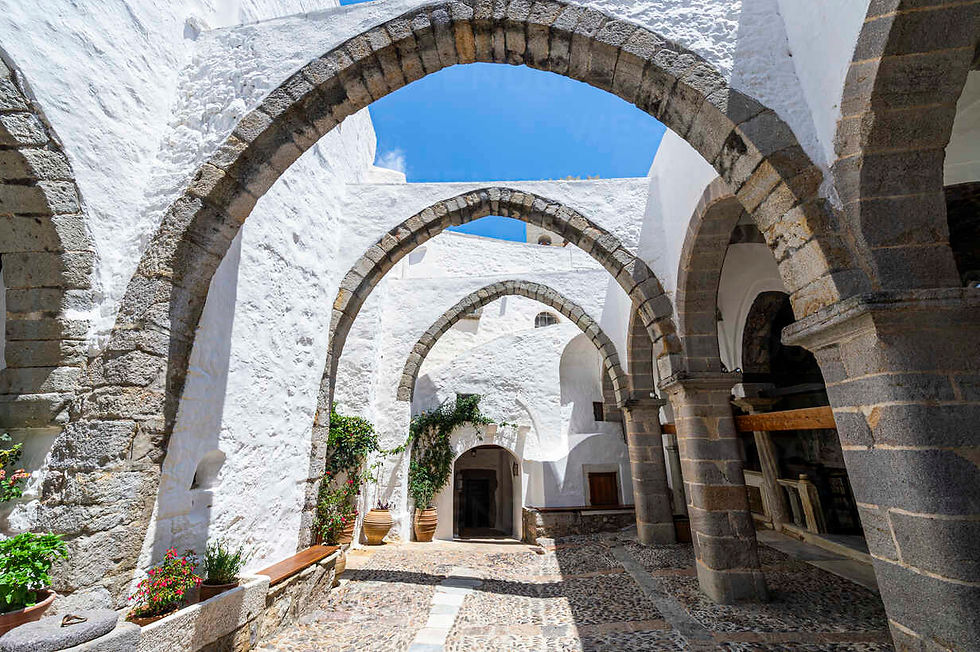Celebrating Easter in Greece..Unique Places to Visit !
- Danaos Travel
- Mar 21, 2023
- 3 min read

Greece is a wonderful Easter destination and even if you aren’t Orthodox Christian, a visit to one of these places during this period will be an experience that will stay with you forever. From the famous pottery smashing in Corfu to fireworks in Hydra, here are Greek Easter destinations that you should add to your list.
Easter is a huge celebration throughout Greece, even more so than Christmas. It is during this time when Orthodox Christians throughout the world celebrate Christ’s death and resurrection. As a result, Greeks take Pascha very seriously and commemorations begin from the week beforehand.

Patmos
On the island where the Bible’s Book of Revelation was written, here visitors are welcomed to the historic monastery of St. John the Evangelist, which UNESCO has declared a world heritage site. The main festivities are the Washing of the Feet ceremony in the central square of Chora, the reenactment of the Last Supper, and the reading of the Gospel in seven languages and in Homeric hexameter. The very spiritual celebration of Easter on the island concludes with the procession of the monastery’s icons on the Tuesday after Easter Sunday.

Syros
This Cycladic island is filled with many Orthodox and Catholic churches, the main being The Epitaphios of the Catholic Evangelistria, the Assumption of Panagia, the Transfiguration of the Savior, and Saint Nicholas, all meet at the main Miaouli Square and Easter services take place. Locals participate in the procession often carrying spears, or sponges, which is a clear reference to the passions of Christ.

Corfu
Corfu is by far the most popular Easter destination in Greece. Each year thousands of local and international visitors arrive on the island to celebrate the resurrection with a variety of traditions, one of the most famous being the throwing of clay pitchers (botides). In the town’s historic centre, with thousands of people, locals throw ceramic pots off their balconies, yelling “Xristos Anesti” (Christ is Risen). Bands play music throughout the town, and everyone is outdoors (day and night) taking part in the festivities.

Hydra
In Hydra island its inhabitants keep the traditions and the religious customs of the Holy Week and Easter. Certainly the Easter holiday in Hydra is different from any other Easter you have lived in Greece.
Visitors to the island throughout the Holy Week and Easter can experience the Holy atmosphere and participate in many different religious customs, throughought the island.
From the middle of the Holy Week, which culminates in the Divine Drama, the locals and the visitors fill the churches, experiencing and participating with intense religious mood and subtlety in the Divine Drama.
Thus the Holy Week flows in religious rhythms and ends in a brilliant Resurrection Night on the Holy Saturday night, to be completed with Judas' spectacular burning on the afternoon of Easter Sunday.
THE HOLY FIRE
At recent years, the Holy Fire is comming to Hydra island the night of Holy Saturday. The Holy Fire is then given to all the Churches of Hydra and later, during the Holy Ceremony and the First Resurrection is being given to the people freely.
THE HOLY RESURRECTION
The night of the Holy Saturday in a pious environment there is a Divine Liturgy at the Holy Virgin Cathedral of Hydra island. The same Liturgy is being done to all the other Churches of Hydra, with the bells tolling happily and giving the meaning of the Resurrection of Christ. The resurrection night the visitor can see many fireworks.
THE DIVINE LITURGY OF LOVE
The Sunday of Easter, before noon, there is a Divine Liturgy of Love, where the priests give one red Easter egg to all the people gathered.

THE BURNING OF JUDAS
All parishes of Hydra had the custom of burning Judas, from old times, at the eve of Easter Sunday. The competition between parishes was great and indeed, during thr Holy Week, churches gouged tray to cover the expenses for the custom.
The preparation for the construction of Judah began long before the start of the Holy Week. They made the large doll as a real man, with the correct size and dress him up with Jewish clothes. Inside the doll put straws.
The doll's left hand made straight and into a fist, except from a finger from where they hung a purse with the 30 silver coins of the betrayal.
@Giorgostsafos

Kalamata
During Greek Easter, on Easter Sunday, Saitopolemos takes place in Kalamata. This is where groups of people wearing traditional costumes hold and light long handmade tubes filled with powder.Each year, thousands of people visit Kalamata over Easter to witness this historical tradition dating back to the Ottoman period.

Chania
Easter is a wonderful time to visit Chania, as you can experience local Cretan customs and traditions and visit many historical monasteries that invite guests to experience the true meaning of Pascha. At this time of year the town’s spring charm also comes to life and not only is it blossoming with flowers, but the sun is also shining and the warmer weather may even allow you to have a swim.



Comments